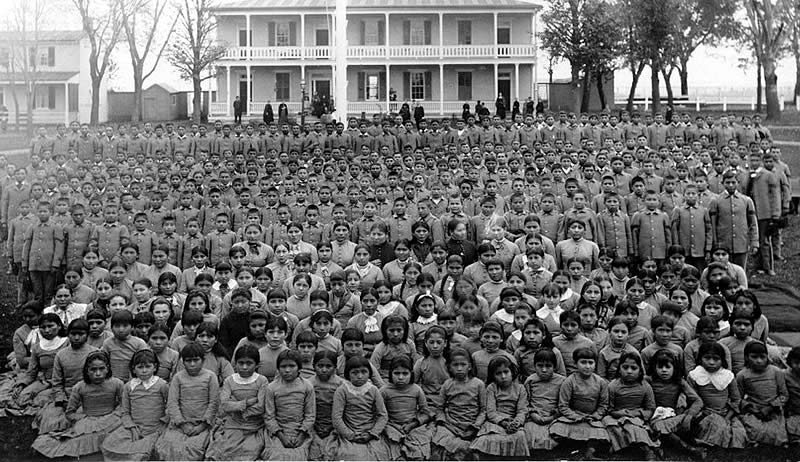The American Indian boarding schools were institutions established in the late 1800s to the mid 1900s with the primary motive of assimilating young Native American children into the Euro-American lifestyle. The first boarding school was established in 1860 by the Bureau of Indian Affairs in the Yakima Indian Reservation in the state of Washington. These were conceptualized by two reformers, Herbert Welsh and Henry Pancoast. They had good intentions from their perspective, as they believed that it was necessary to "civilize" these people and that doing this would be better for them. These schools were effective at removing the parts of these children's cultures that would impede the progress of Manifest Destiny.
Children that attended these schools were often forcibly removed from their culture, where they were isolated from their families and forced to adapt through methods such as banning the use of their language and giving them new European names. Children would learn how to read, write and speak in English. They would also be taught other major subjects, such as mathematics, science and history. Religion was also a major part to these programs, and Native American children were taught Christianity. All of this was in an attempt to remove Indian culture and impose a more "civilized" Euro-American culture.
One influential player in the American Indian Boarding Schools was Brigadier General Richard Henry Pratt, who was the founder and superintendent of Carlisle Indian Industrial School in Pennsylvania. He was known for his viewpoint on the education of Native Americans, saying "A great general has said that the only good Indian is a dead one [...] I agree with the sentiment, but only in this: that all the Indian there is in the race should be dead. Kill the Indian in him, and save the man." Essentially, "Kill the Indian" refers to the removal of the Native American culture from these children, which was seen as savage and uncivilized, and keep the man. By removing their original culture and imposing Euro-American culture, they would somehow become more of a man than before.
Many children suffered and died from disease due to the overcrowding and the change in environment. Tuberculosis was especially common among students, and many were sent home after contracting it.
These schools left a lasting impact on the Native American culture. Many felt entirely estranged with their families and culture after returning home, and the majority identified more with Euro-American culture than they did with their own. From the perspective of the Americans, these schools were a complete success, as they removed a generation of potential threat to the Americans by forcing them to leave behind their culture, and they also expended less money than if they were to militarily wipe out the Native Americans.

Sources:
I think your post brings into light a very deep concept and important piece of American history. The way you discussed the ways Americans forcibly removed Native Americans from their culture is extremely important should be talked about more in the history we learn about today.
ReplyDeleteI enjoyed this post because it went into detail about something that is often overlooked today. Our country's actions towards Native Americans were not exactly commendable, and flaws like those should be discussed more.
ReplyDeleteI think that post describes the real impact of the American Indian Boarding Schools very well. I like how you mention that the condition of the Native Americans is often overlooked because of the extreme treatment of slaves. I think that along with the idea of Manifest Destiny, many Americans also started to believe in the idea of the White Man's Burden. This is where they believe that the white culture is superior to that of the Indians and take it upon themselves to change the Indians way of life. As you mentioned, they were forced to read, write, and speak english and also were taught Christianity. They had to cut their hair and give up traditional clothing as a means of removing their Indian culture.
ReplyDeleteSource:
https://americanindian.si.edu/education/codetalkers/html/chapter3.html
Thank you for expanding on the uncomfortable experiences of Native Americans in the boarding schools, as it shows just how insensitive Richard Pratt and his supporters were to the Native American culture. Floyd Red Crow Westerman, who became a performer and Indian activist, was still haunted sixty years later by memories of his experiences in the boarding school. He remembered leaving for the Wahpeton Boarding School in North Dakota and not understanding why he was leaving his mother. For his entire childhood, he was away from his family and culture that he was born into. Once he became an adult, he wrote songs to cope with the memories of the boarding school. Westerman is just one of many Native Americans who were stripped away from their families and culture at a young age to become more "American".
ReplyDeletehttps://www.npr.org/templates/story/story.php?storyId=16516865